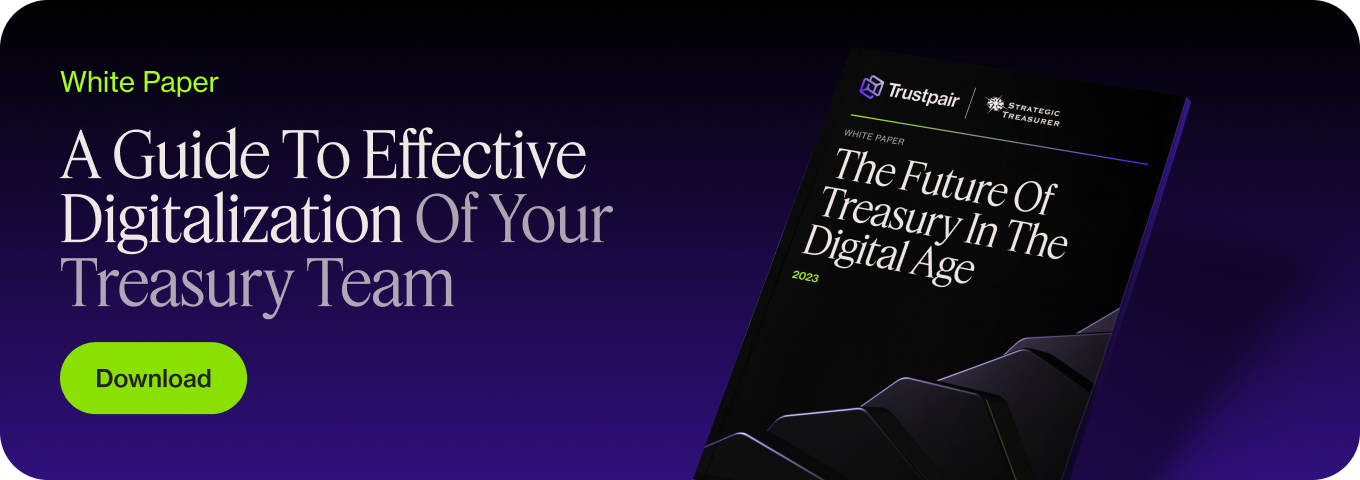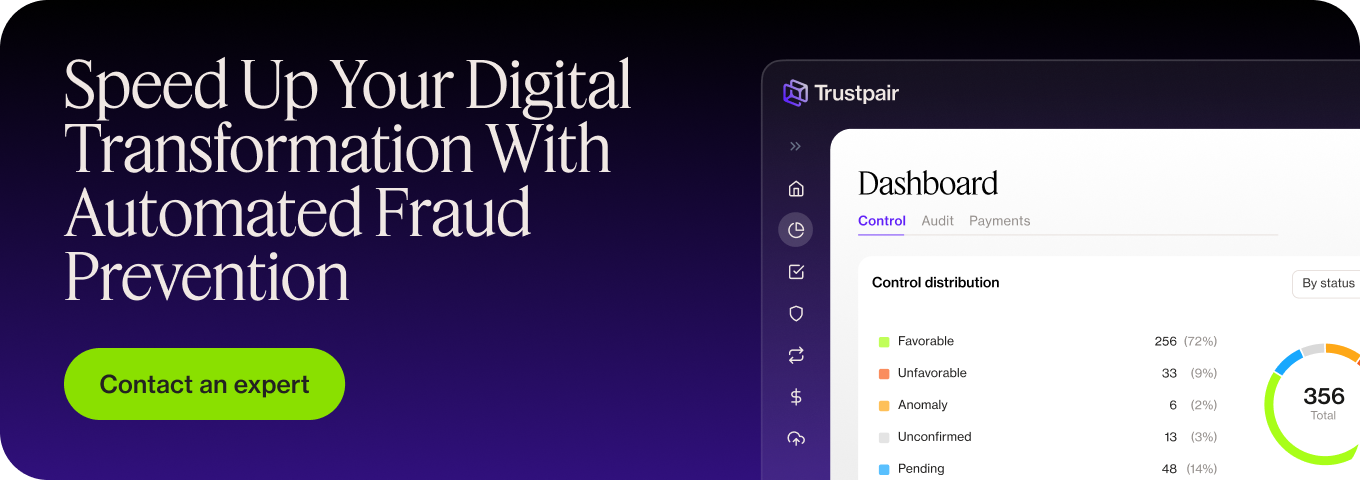Every company and industry is impacted by digital technologies, such as the cloud, big data, and social media. The finance department is also increasingly subject to digital transformation finance. An independent survey by the specialist recruitment firm Robert Half reveals that finance digitalization (91%) is going to be the main investment focus for finance directors. Today, the cloud, mobile technologies, social media, and big data are an integral part of economic life. However, the question arises whether companies are sufficiently equipped to cope with digital upheaval. More than three-quarters (79 percent) of CFOs are confident that they can meet the growing challenges of digitalizing their financial department. Only one-fifth do not feel up to it (19%).
To learn trends and best practices about finance digitalization, download our white paper!
Finance digitalization explained
In the past decade, the rise of online payment for instance has transformed the way money is sent and tracked. Financial and accounting departments have had to adapt to this change by using different processes and tools.
Many software and tools have emerged to help employees do their jobs more efficiently. Cash flow management, invoicing, and reconciliation are now easier than ever thanks to new technology. That’s finance digitalization.
The role of Finance departments has changed a lot with new technologies, disrupting established business processes. Some go as far as calling the rise of digital innovation the fourth industrial revolution!
Day-to-day, we’ve moved away from manually inputting data and building financial dashboards to focusing on data analytics and higher value-creation activities. That’s made possible by artificial intelligence and machine learning, which are able to process huge amounts of data and spot patterns more efficiently than humans can. In the digital world, tools can manage time-consuming tasks in a matter of minutes (or even seconds) as well as help streamline your business operations.
Far from impacting Millennials only, technological transformation disrupts the finance industries for the better. This resulted in many entrepreneurial opportunities, with the creation of startups and the whole FinTech ecosystem.
Anti-fraud software like Trustpair have been created to automate tedious manual processes. Our solution runs automated controls on your third-party credentials and is able to spot any anomalies. We improve your cybersecurity and eradicate the risk of B2B payment fraud. The benefits of digitalization for financial teams
The benefits of digitalization for financial teams
There are many reasons to include more digitization in your company – we’ve selected 3 main ones below.
More time and profitability
Having software take care of your tedious and repetitive tasks means freeing up a lot of your team’s time. Finance digitalization can help automate your:
- Data input,
- Receivable follow-up,
- Invoicing and billing,
- Payment reconciliation,
- Payroll management
Etc.
This will transform your business to be more productive and efficient. The time and energy saved are better used on more strategic tasks which will lead your company forward. Your employees will also enjoy their new-found ability to take on bigger and more stimulating projects.
With digital technology, you can now focus your efforts on improving your profitability and increasing your operational efficiencies. In turn, that allows your whole organization to be more productive.
Better risk management
Risk management is one of the priorities of financial departments and financial institutions alike. Whether it’s for improving your cash flow management or reducing your fraud risks, financial technology can help give you a competitive edge.
Finance digitalization tools are here to help you create more efficient and more secure workflows. That means improved processes for you but also a better customer experience for your users. Indeed, digital solutions are usually customer-centric and therefore provide more customer value.
Using software also helps meet the legal and business needs of the banking and finance sector. Digital transformation makes it easier to produce financial statements and remain compliant with your local regulations. It’s easier to do when the accounting software you’ve been using knows you’re working toward that goal and organized the data for you.
Digital tools also tend to be less error-prone. When it comes to numbers, we know how much it matters to get it right!
Better data management
Finance digitalization also means you can quickly process a huge quantity of data. Digital platforms turn complex data into key information that’ll help improve your decision-making.
It’s easier to take the right next step when you know the data you see is accurate and (often) presented in real-time.
Finance automation tools centralize your information into one globally connected hub, where it’s easily accessible. Financial software automation helps you organize your data with tags, or by spotting patterns you’d otherwise have missed.
Key trends of financial technology in the digital age
Companies born to offer a fully digital financial service must base their added value on the use of advanced technologies and the latest programming languages, which make all operations flexible and fast, and above all, allow them to have quick and automated access to a huge amount of data.
Financial services institutions face the challenge of engaging with their customers through the channel of their choice. They must provide consistent and intelligent interactions in a timely, secure, and financial regulatory manner. They must therefore make a greater commitment to their customers. A committed supplier increases its chances of success in its market.
Artificial Intelligence (AI)
AI integration is a new step toward digitalizing the financial industry. It can be used to deal with huge quantities of invoices, link supporting documents to clients’ accounts, streamline your accounts payable process, or even detect fraud in your cash flow.
Artificial intelligence can also be used to make predictions based on already existing data. That’s helpful to make predictive analysis on your revenue, but also for detecting fraud by spotting suspicious activity. Learn all about AI fraud detection here.
As AI is constantly evolving, it is everyone’s guess as to what our digital future will look like. We can safely assume that new start ups will emerge, creating new digital business models and changing the future of work with their innovations. One thing remains certain: many organizations would gain a competitive advantage if they leverage new technologies now.
Blockchain
Blockchain is a digital database that stores information (such as financial transactions) that can be used and shared within a decentralized network. It works with no governing bodies, in a completely secure way.
This technology and its many applications (smart contracts, cryptocurrencies, …) have created a whole new financial system with more financial inclusion. It’s already caused severe disruption in the financial services industry.
As the name suggests, all transactions in blockchains are gathered in blocks. Each block needs to be validated by the network’s nods (that is to say, its members). Once the block is validated, it is added to the blockchain and becomes visible to all users. It’s a system based on transparency.
Because it is decentralized and automated, blockchain can make transactions without human intervention – quicker and cheaper than what was traditionally done in the financial industry.
Big Data
Big data is a concept used to define a vast quantity of data, covering a variety of scopes, collected at high velocity (which we call the 3Vs).
It can be used by organizations to anticipate behaviors, make predictions, and establish a new business strategy. While financial services have always created a lot of data, big data has now become a key resource for decision-making. That’s for two reasons.
Digital tools:
- Can collect a huge amount of data,
- Make data processing and analysis easier.
Besides, cloud-based big data solutions mean reducing operational costs normally linked to on-premise installations. They also lead to more agility in your business process and increased data protection. Open digital banking now allows for sharing of data collected by banks with other companies. All this data can be used to innovate and improve banking and financial services.
New technologies disrupting the workforce
The impact on the financial ecosystem
Finance digitalization is a heavy and topical issue for companies of all sizes, which are, overall, lagging behind their counterparts. The financial system must adapt to these digital changes facing businesses.
Traditional financial services institutions, constrained by often rigid historical systems and processes, are under enormous pressure to renew quickly to retain and attract new clients. They are facing competition from much more agile “FinTech” institutions capable of rapidly launching new mobile services that respond quickly to customer needs. Fintechs clearly impose a new economic model on the market.
Traditional banks do not digitalize on the model of Fintech realities, the reason is that these are mostly in situations close to technological lockdown. In other words, changing its technological structure has high costs of passage, to the point of discouraging the change itself. This happens because traditional banks find themselves using obsolete information and operating systems, which are now embedded throughout the organization.
The implications for teams involved
Far from questioning its preservation, finance digitalization adds to the business value of financial departments. In our digital age, a number of daily tasks can now be delegated to digital solutions. For financial services, it means a greater ability to focus on activities that add to the value chain, becoming even more of a business partner.
And for this to happen, you need to choose the right tools! Leveraging digital technologies requires investing in the ones that fit your business needs.
It looks like the better candidates for the executive financial jobs will be the ones who are adaptable. People who understand the fundamentals of finances, while being able to further implement business transformation in an increasingly data driven digital world.
We already see it in top management, with the inclusion of a Chief Digital Officer as the enabler of a company-wide digital strategy. There is undeniably a need for transformation for medium and large companies. That’s especially true with the rise of new businesses (and new business models) that are born in this digital revolution.
To stay in the loop in this new digital era, new competencies should therefore be acquired by financial teams:
- The ability to be agile, implement a digital roadmap, and follow a transformation framework,
- Leading change management to accompany the transformation strategy,
- Understanding the impact of digital on a relational level and adapting their team’s mindset to it,
- Adopting new tools and new ways of doing their job.
As the digital age transforms the finance industry, be a leader in finance digitalization
Digital finance must adapt to the company to take advantage of the opportunities offered by its various data sources. However, we must not forget that simply collecting data will never be enough. Advanced data science and analytical skills are required to interpret and extract useful information, as EPM (entreprise performance management) tools are essential to this task.
The company must have day-to-day analytical resources so that the financial department can conduct enterprise-wide analytical initiatives. The tools that enable these innovative FP&A (Financial Planning & Analysis) functions integrate technologies such as AI (artificial intelligence) and machine learning, which offer the finance department new capabilities.
Finance digitalization is still in its infancy, and the financial system should be much more in demand tomorrow than it is today.
Digital platforms allow you to optimize and secure your Procure-to-Pay processes through automation. Trustpair, the B2B Payment Fraud Prevention Platform, helps you to better collaborate between Finance, Procurement, and Compliance teams by providing solutions for automated checks of third-party banking details. Its Artificial Intelligence-based technology continuously monitors vendor data to alert you to any detected errors or anomalies. Payments are secure and teams save time.
Request a demo with our expert team to know more about Trustpair’s Platform.






